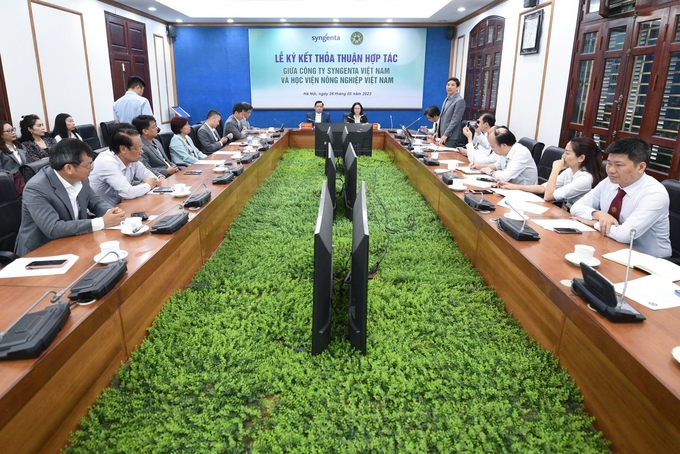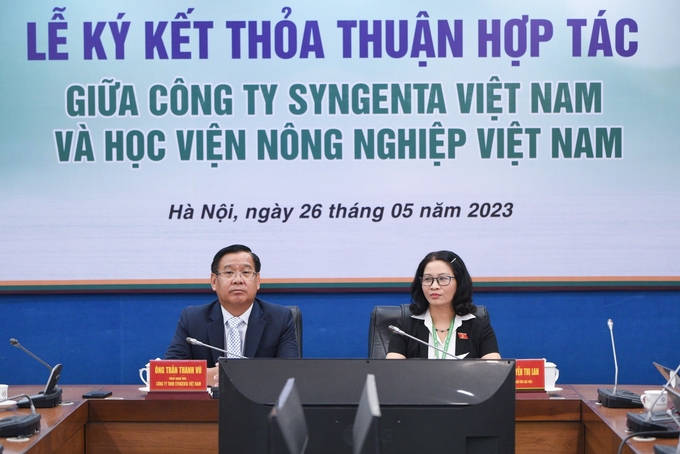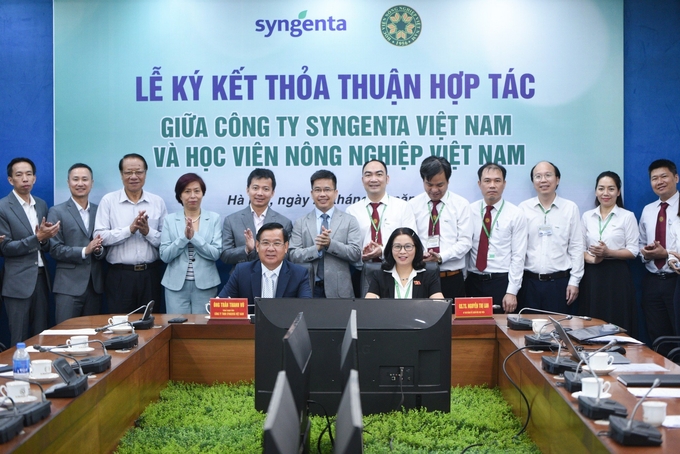May 31, 2025 | 16:39 GMT +7
May 31, 2025 | 16:39 GMT +7
Hotline: 0913.378.918
May 31, 2025 | 16:39 GMT +7
Hotline: 0913.378.918

Syngenta Vietnam and Vietnam National University of Agriculture recently signed a Cooperation Agreement on promoting high-quality human resources in the agricultural sector. Photo: Tung Dinh.
Syngenta Vietnam Co., Ltd. and Vietnam Academy of Agriculture officially signed a Cooperation Agreement on promoting high-quality human resources in the agricultural sector on May 26 in Hanoi.
Mr. Tran Thanh Vu, General Director of Syngenta Vietnam and Prof. Dr. Nguyen Thi Lan, Director of the Vietnam National University of Agriculture, attended the signing ceremony along with representatives from various departments under the two parties.
The shift of labor force from agricultural production to industrial and service sectors has become increasingly common in recent years. However, this shift has lead to a labor shortage in agricultural production, including skilled labor for high-tech agriculture.
State management agencies and agricultural businesses both face significant difficulties due to a shortage of high-quality human resources and constraints in the application of advanced agricultural technologies.
As a leading global corporation specializing in sustainable agricultural development, Syngenta Vietnam is a pioneer in implementing solutions to improve quality, and attracting qualified human resources to support farmers in applying advanced scientific technologies to modern agricultural production.
Syngenta Vietnam has actively pursued and signed multiple cooperation agreements with prestigious universities across the country, including Can Tho University on September 2022 and Ho Chi Minh City University of Agriculture and Forestry on March 2023. These agreements primarily focused on promoting human resource training and scientific research.
Following a series of key cooperation activities, Syngenta Vietnam signed a cooperation agreement with the Vietnam National University of Agriculture on May 26. The three main focuses of this cooperation were training, technology transfer and scientific research.

Mr. Tran Thanh Vu, General Director of Syngenta Vietnam and Prof. Dr. Nguyen Thi Lan, Director of Vietnam National University of Agriculture believe that the two parties will engage in meaningful cooperation activities in the near future. Photo: Tung Dinh.
According to Prof. Dr. Nguyen Thi Lan, her University currently supports 46 research groups, focusing on the national agricultural development strategy, and key target export groups.
Most of her students come from a farming household so they are hard working and determined; many of whom excel in class but their families struggle financially. Consequently, Prof. Dr. Nguyen Thi Lan hopes to collaborate with organizations like Syngenta Vietnam in order to provide her students with the opportunity to train, practice, and work.
“The University expects cooperating companies to participate in the development of training programs as well as the training process. We can help students to improve their skills and knowledge through practice, and encourage the start-up movement through scholarships”, shared Prof. Dr. Nguyen Thi Lan.
Prof. Dr. Nguyen Thi Lan highly regarded the growth of Syngenta Vietnam as a leading unit in agro-pharmaceuticals, seeds, etc. She looks forward to a long-term and sustainable cooperation with Syngenta Vietnam after the cooperation agreement was signed.
Ms. Nguyen Thi Lan suggested the two parties to cooperate in capacity building as well as scientific research. Namely, scientists from the Vietnam National University of Agriculture can coordinate with Syngenta Vietnam to manufacture useful and practical products.

Syngenta Vietnam and and Vietnam National University of Agriculture signing the agreement. Photo: Tung Dinh.
According to Mr. Tran Thanh Vu, General Director of Syngenta Vietnam, the company identifies human resources as a key factor to success. As a result, one of Syngenta Vietnam's main goals is to collaborate with research institutions and universities to train and develophighly qualified human resources.
"The cooperation program between Syngenta Vietnam and the Vietnam National University of Agriculture is an important step towards a long-term and close partnership in the training of dedicated and talented agricultural engineers who will devote to improving the lives of farmers and innovating Vietnam's rural landscape", emphasized Mr. Tran Thanh Vu.
The two parties discussed future cooperation activities after the signing ceremony. Namely, the Vietnam National University of Agriculture is looking forward to learning about Syngenta Vietnam's needs for human resource. Subsequently, the two parties can place orders for the supply of personnel from the university students.
In addition to cooperation in training and scientific research, Syngenta Vietnam awarded 150 million VND worth of scholarships to struggling students, and students with outstanding academic and scientific achievements at the Vietnam National University of Agriculture. This meaningful activity has encouraged disadvantaged students to focus on their study in the future.
Cooperation activites between Syngerta Vietnam and Vietnam National University of Agriculture
In the field of training
Syngenta Vietnam will invite University students to the company's headquarters to familiarize themselves with the working environment, practice professionally with a team of experienced instructors as well as create employment opportunities for them after graduation.
Furthermore, Syngenta Vietnam will organize various seminars, forums, scientific conferences, etc. where students can meet and exchange with experienced agricultural experts and engineers.
Syngenta Vietnam will coordinate with the University tofoster a generation of high-quality human resources, who are ready to support farmers in agricultural production.
In the field of technology transfer
With the newest technology at its disposal, Syngenta Vietnam is a leading business that improves agriculture in Vietnam by providing secure and long-lasting solutions. Accordingly, the two parties will enhance professional training courses and technology transfer; build and apply production models in related fields to help farmers improve farming practices, increase productivity and crop quality.
In the field of scientific research
The two parties will conduct scientific research and trial projects in different fields to aid agricultural production. Additionally, they will work with farmers to utilize new technologies in production to increase the value of agricultural products, encouraging the long-term growth of Vietnam's agricultural sector.
Syngenta Vietnam plans to expand its cooperation scope with ministries, departments, universities, and leading agricultural research institutes in order to improve the quality of human resources in terms of professional qualities, knowledge and capacity. Moreover, the company will promote innovative solutions and the sustainable development of Vietnam's agricultural sector.
Translated by Nguyen Hai Long

(VAN) Several scientists and farmers are experimenting with soil treatment in some key durian-growing regions such as Cai Lay (Tien Giang), Dak Song, Gia Nghia, and Dak R’lap (Dak Nong).
/2025/05/25/4127-3-073637_820.jpg)
(VAN) Thanks to the promotion from an FAO-implemented project, vegetable production in greenhouses in Moc Chau has seen strong development, from 1.5 hectares in 2021 to nearly 50 hectares in 2024.

(VAN) FAO has recently supported USD 140,000 to implement the project 'Risk mitigation human-animal interface risks through disease control initiatives in pig farming.'

(VAN) The People's Committee of Tra Vinh province has approved an adjustment to the investment policy for the Green Hydrogen Plant project, increasing its area to approximately 52.76 hectares.
![Reducing emissions from rice fields: [2] Farmers’ commitment to the soil](https://t.ex-cdn.com/nongnghiepmoitruong.vn/608w/files/news/2025/05/05/dsc08881jpg-nongnghiep-140632.jpg)
(VAN) Clean rice cultivation model in Thuong Tan commune, Bac Tan Uyen district, is assisting local residents in achieving sustainable agriculture by substantially reducing costs, increasing productivity, and protecting the environment.

(VAN) At the conference to disseminate Resolution No. 68, AgriS introduced its digital agricultural ecosystem and reaffirmed its commitment to accompanying the Government in promoting private sector development and sustainable agriculture.

(VAN) 'Blue Ocean - Blue Foods' initiative is designed to restore marine ecosystems and establish sustainable livelihoods for local communities by cultivating a minimum of 1,000 hectares of cottonii seaweed in the first three years.